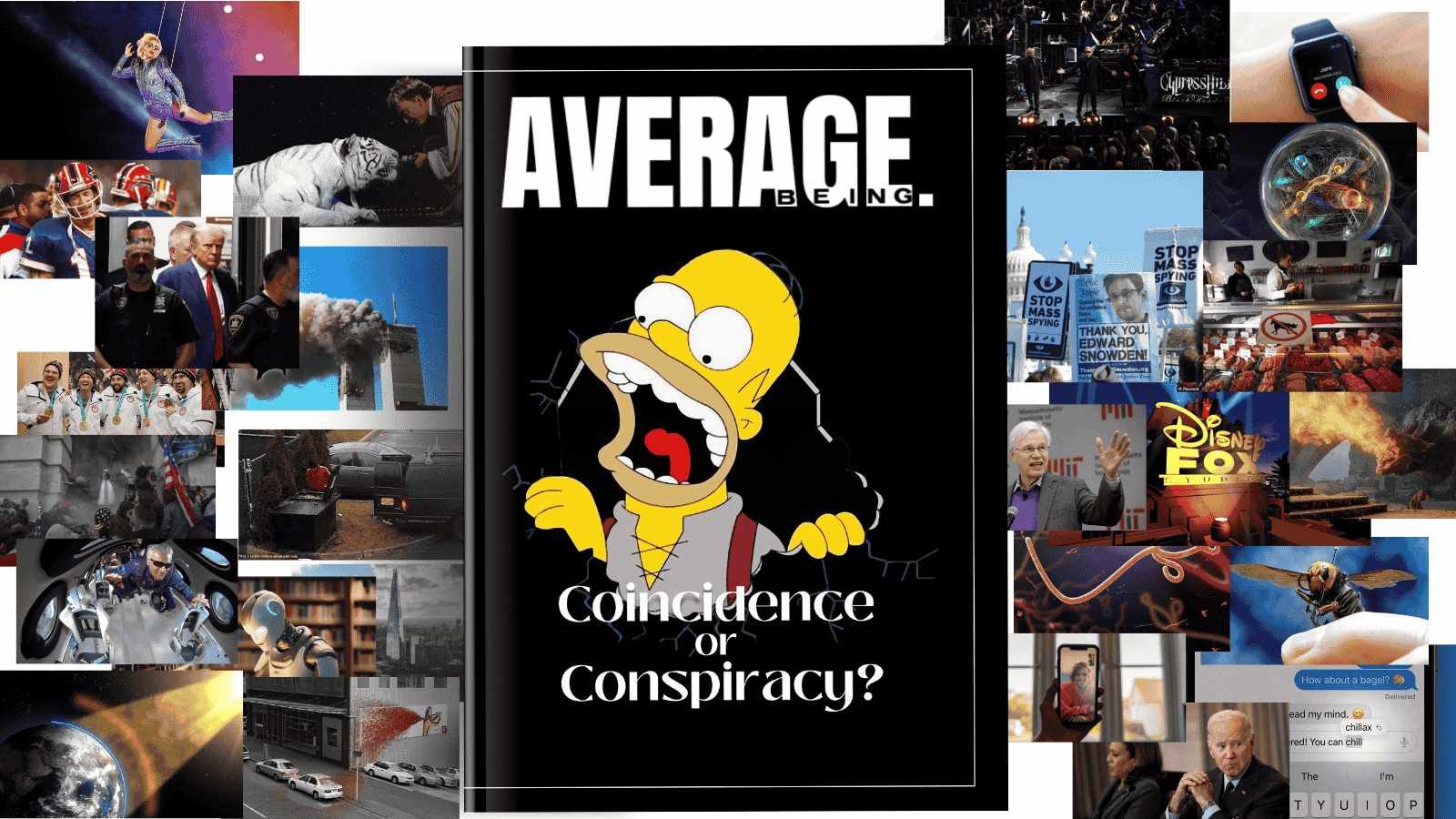September 11, 2001. Nineteen terrorists from al-Qaeda hijacked four commercial airplanes and crashed two of them into New York’s Twin Towers.
Despite their cutting-edge technology, and global reach spanning numerous countries, U.S. intelligence failed, humbled, exposed as they stumbled spectacularly on world stage.
On that day, these terrorists drove a dagger into the heart of what we believed was impenetrable. They made a statement. They’ve screamed to the entire world: “Your guardians can’t protect you. Your walls can’t hold us. Your strength is an illusion.”
The 9/11 attacks are something the world has never seen before. Yet, where the influential, the privileged, the so-called protectors with so much power failed, the frames of an animated TV show could have stopped it all.
This cartoon series foresaw the terror attack and screamed silently from our screens four years before that fateful day. If only we had opened our eyes, if only we had listened to them sooner. Perhaps… perhaps we could have changed the course of history.
That prediction changed the boundary between coincidence and conspiracy, and soon, everyone’s trying to figure out how they knew what was coming.
A yellow family with huge eyes, four fingers, living in a town that’s nowhere, somehow knows our future.
Some whisper they’re time travelers. Others claim they’re puppets of a secret society called the Illuminati. Most of us laugh it off. It’s a coincidence, we tell ourselves. But deep down, at our core, our inner voice reminds us we’re lying to ourselves.
Time and time again, their predictions rang true. They have painted portraits of a world yet to come, each one cutting deeper than the last, but these are no isolated incidents. These were merely pieces of a much larger, more terrifying puzzle.
For years, they’ve always been a mystery—a riddle none have been able to solve, until now.
Disclaimer: This is not your typical case study optimized for Google search. This is me narrating to you exactly how events unfolded for me. Trust me, it’s really worth it to read the article this way.
Chapter I: Understanding The Predictions
For me, it all started with a tweet. A tweet claiming that The Simpsons predicted Donald Trump’s presidency.
I was shocked to see people online believed that an animated TV show laid out the answer to 136 million votes 16 years before any of this happened.
When I looked for more details on this prediction. I found out that on March 19, 2000, The Simpsons aired an episode called, ‘Bart to the Future.’ Around the 10-minute mark, Homer’s daughter, Lisa Simpson, who becomes the president of the United States, says this:
“As you know, we’ve inherited quite a budget crunch from President Trump.”
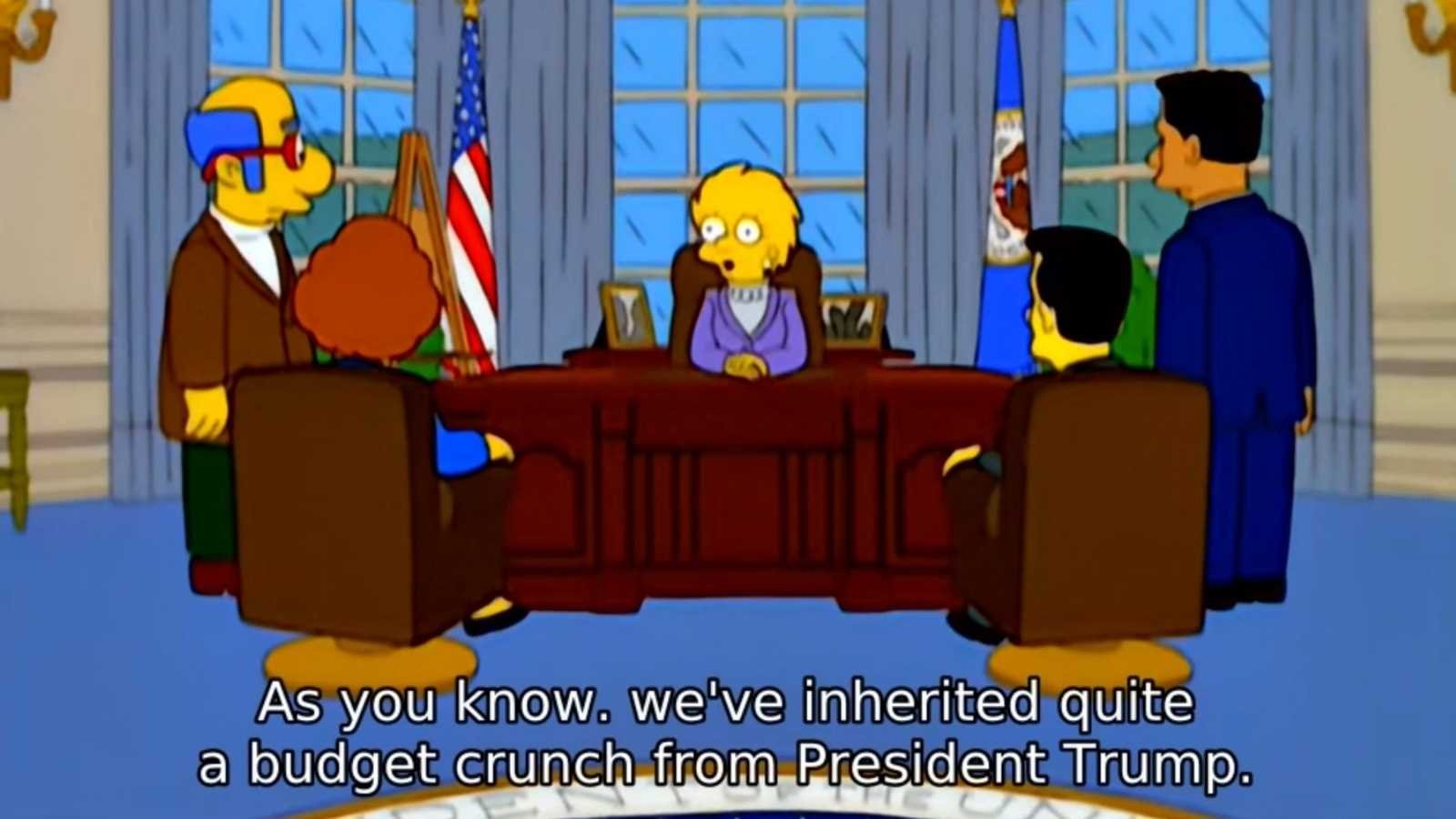
I remember thinking how. How could they foresee the presidential elections?
But it didn’t stop there. People began to dig deeper around the Simpsons, and it’s only a matter of time, until I came across some of their other predictions.
The infamous FIFA scandal that shook the world, Canada legalizing Marijuana, Ocean Gate’s disaster that killed all 5 passengers, the NSA quietly watching our every move, the Silicon Valley Bank crash, the collapse of Baltimore Bridge, the launch of Apple Vision Pro, Games of Thrones finale, Nuclear tomatoes, and even Greek’s economic collapse.
To be honest, I was hesitant at first and backtracked each one of them.
Some turned out to be fake, but a lot of these predictions are actually true. Turns out, those online theories on Reddit weren’t so crazy after all. The internet was right, the media was right all along, or so I thought.
As I began to believe that the Simpsons could really predict the future, a sense of unease quietly crept within me.
I’m not sure how to describe it, but something just felt off, and when I actually put some thought into it, I realized that these things we all see on the internet, aren’t true predictions at all.
It might seem hard to digest when we have to rebuild our entire belief systems, but I found a pattern— a formula The Simpsons are using to spot these events and get into the headlines.
So, this is how they’re doing it.
The Simpsons often take early reports that are not in the public eye, things that seem unlikely at that point in time, and portray them in a way that feels almost prophetic. When these predictions come true, they become part of our collective reality.
Let me explain.
Back in 1998, Homer Simpson wrote an equation in Season 10 Episode 2. Fourteen years later, in 2012, this result roughly matches the Higgs Boson’s discovery, which scientists only got to after spending years of research and millions of dollars.
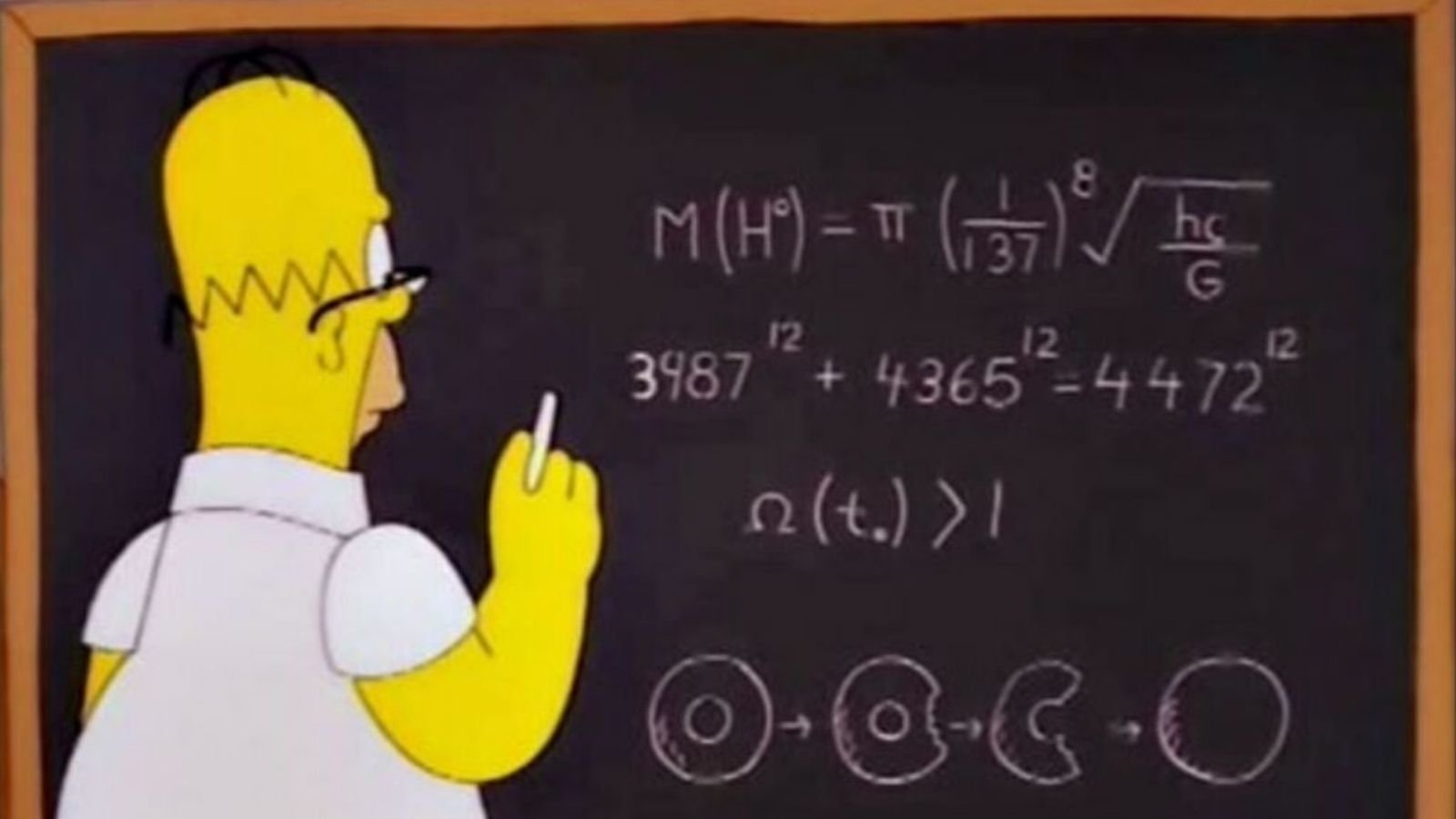
The internet went crazy, and yet again, The Simpsons were crowned as the TV show that predicts the future. But what if I tell you, they didn’t just pull this out of thin air?
The Simpsons took something that wasn’t popular and made an educated guess at a scientific equation that was already there. Years later, when it actually came true, we began to reinterpret it.
Think about it. The writing was always on the wall, but did anyone really see it coming?
Moving to something a bit more easy to understand, Imagine a time when smartwatches were barely on anyone’s radar. The concept seemed futuristic, something out of a sci-fi movie.
Still, The Simpsons not only introduced smartwatches but watches that allowed people to talk through them. This is a perfect example that fits into our formula— an idea ahead of its time, an idea so far-fetched that it might seem unrealistic but destined to be adopted by the masses and make waves in the years to come.
Even Disney acquiring Fox Studios for a massive $71 billion dollars wasn’t a shot in the dark.
Take a look at this:
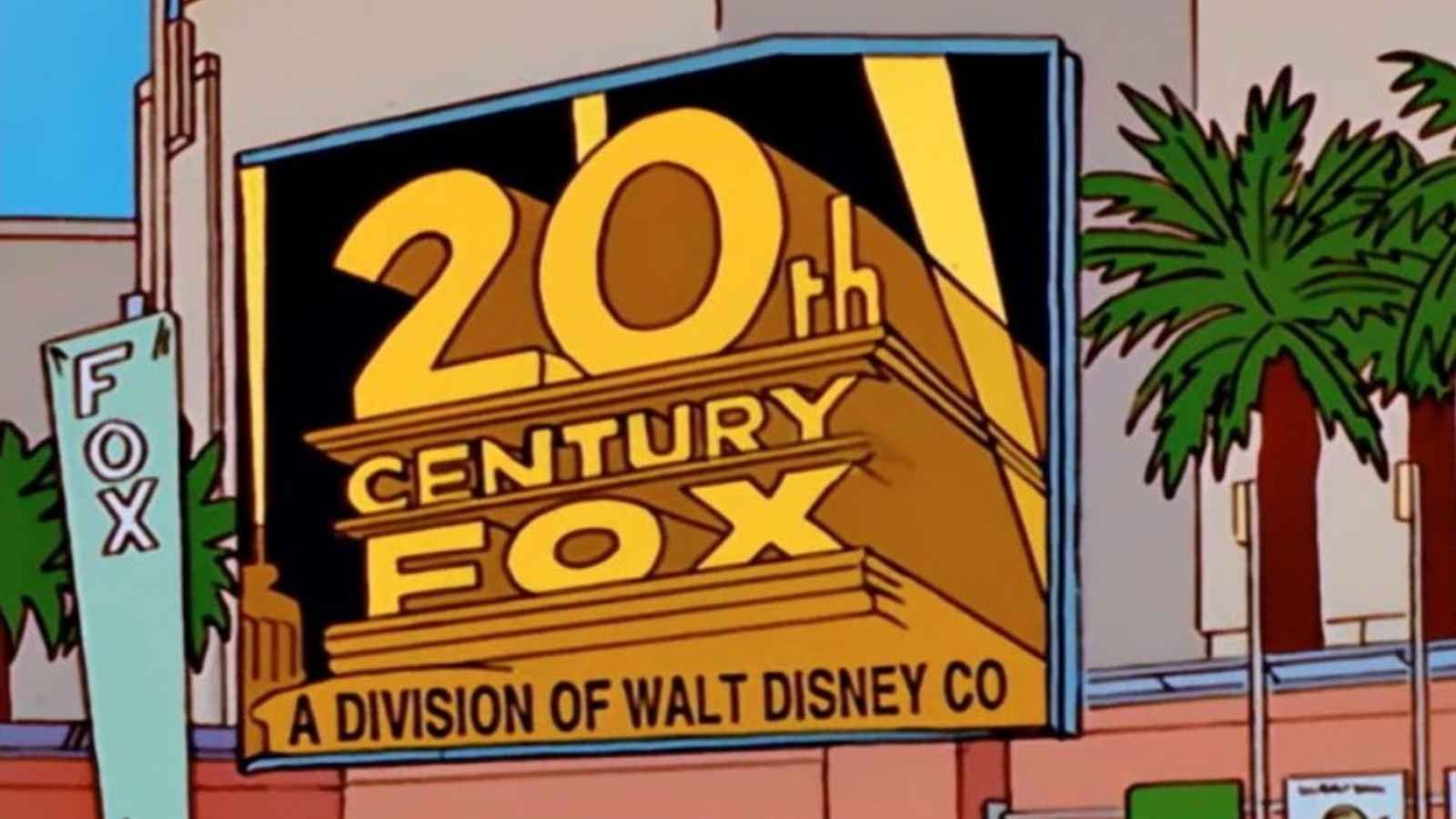
At first glance, it seems like a lucky guess or, at least, something the Simpsons could easily pull off.
One could go down that rabbit hole of glorifying this prediction, but did you know that Fox was losing money when the episode aired?
Its cable network programming unit lost $141 million dollars in 1998, compared with a loss of $148 million dollars a year ago, all while Disney profits pushed stocks to a record high.
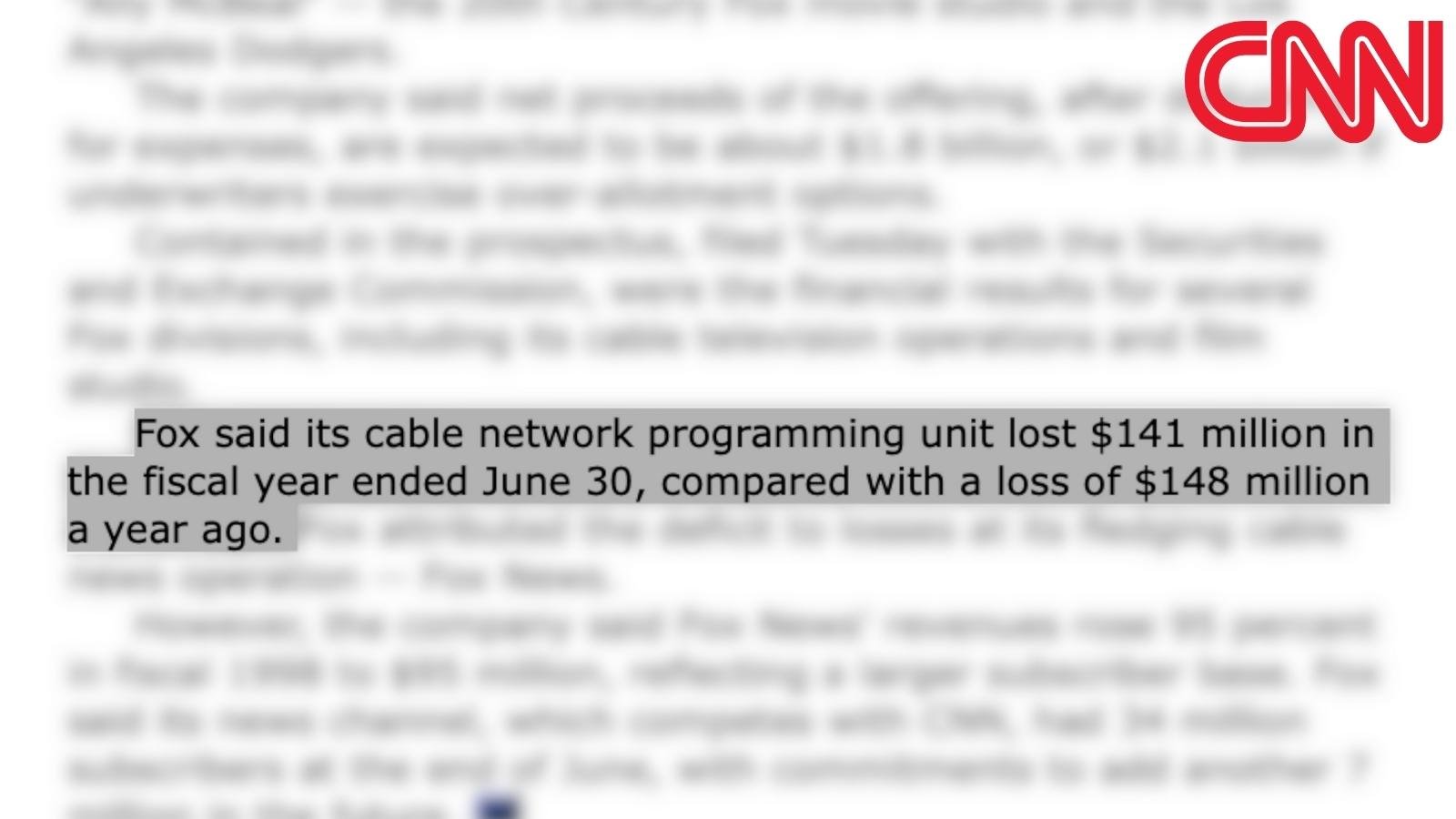
Makes you wonder, doesn’t it? How much of this was really foresight, and how much was just keen observation?
These so-called “prediction experts”?
They’re nothing but glorified trend-spotters, snatching up whispers and half-baked ideas to plaster across their show.
It all made sense to me now. I knew exactly what they were up to. We saw through their plan. We had their game all figured out. Right?
I bought into the act, thinking I was in on a secret.
But then, one question shattered this illusion.
It didn’t just change the game – it flipped the whole damn table, and we couldn’t be more wrong about The Simpsons.
Chapter II: The Odd Predictions
Most predictions from The Simpsons can be explained with a reason, most of these fall into our formula, but what about the ones that don’t fit into our framework?
The ones that don’t have a pattern or a logic behind them? How do we explain the odd ones?
The 9/11 attacks they predicted don’t really have an early report of the terrorists planning anything in New York. London’s Shard construction magically appeared on The Simpsons even before a blueprint was ever released to the public. 2013’s Horse meat scandal in Europe, where restaurants practically replaced beef with uncertified horse meat is never heard of, and the mutated fish with three eyes caught near a nuclear power plant, is just unreal.
But these events turned out exactly how The Simpsons predicted they would.
I looked for some theories online, and they have nothing to backtrack to. There’s nothing concrete to look into here. No previous history, no early reports by the media, nothing.
I knew it. Sooner or later, I would reach a dead-end. The more I looked into it, the more I found my back against the wall.
It feels like the truth slipped right through my fingers at the last second. I just felt trapped with no way out, and suddenly, my head was spinning with a million questions.
Maybe The Simpsons really are from the future. Maybe, there’s a secret society behind them pulling the strings.
Is the world we live in all scripted? Does anything matter anymore? Is anything real anymore?
Uncertainty is all I can see, and the light at the end of the tunnel is beginning to fade away.
Then, this happened.
[I was around 6:30 p.m. and I got a call from Mom.
Me: Hey, mom.
Mom: Hey, I will be late today. Can you cook some rice for dinner?
Me: Sure.
Mom: What’s wrong? You sound low?
Me: mmmm…it’s nothing.
Mom: Come on. Tell me.
Me: So, I am working on a case study, and I kinda reached a dead end here. There’s this TV show that has been predicting major events from the future. Things like Europe’s economic collapse, the 9/11 terrorist attacks, or even the submarine disaster we saw on TV.
Mom: I’m not sure I understand it, but you’re telling me that someone out there is seeing into the future?
Me: Yes.
Mom: That’s not how it works. Who’s working on it? I mean, who’s creating these episodes?
Me: Ah…Thank you, mom. I got it.
Mom: Wait…]
That’s the entire conversation, and when I heard my mom say, “Who’s creating it?”
I realized we’ve been asking the wrong questions all along.
Chapter III: Solving The Predictions
At this point, most people give up. They might be satisfied with some theory or just dismiss these as coincidences, but they give up.
If it wasn’t for that call from my mom, I might have.
So, I finally got that lead I was looking for and what I’m about to do is something I never thought I would have to go through in a million years.
So, who are these people behind The Simpsons, and how are they predicting the future?
In the past 35 years, more than 152 individuals have been credited with writing and co-writing episodes of The Simpsons, including the movie. But did you know that only 35 of them are actually responsible for these wild predictions?
That’s just a handful of writers who are behind all those glimpses into the future. A tiny group of creative geniuses has cooked up everything we’ve seen so far.
And here’s one of these individuals opening up on how they could see into the future.
On 16th November 2021, The Simpsons showrunner Al Jean commented on the cartoon’s uncanny ability to predict global events.
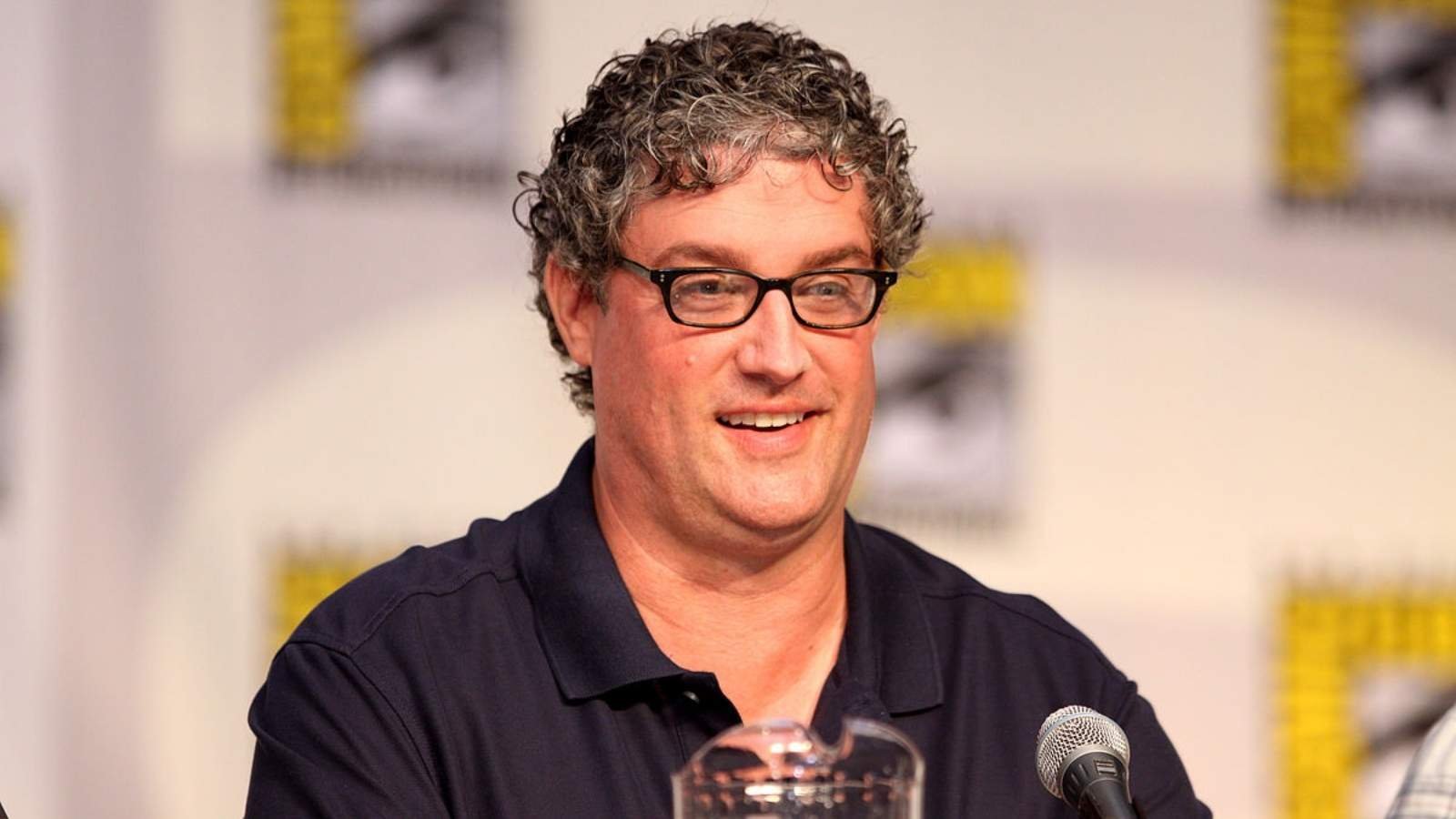
He said,
“One of our writers, the guy whose episode predicted Donald Trump as president, said it best: ‘If you write 700 episodes, and you don’t predict anything, then you’re pretty bad. If you throw enough darts, you’re going to get some bullseyes…’”
So, let’s address the elephant in the room. Does this really explain the odd predictions we talked about? Is coincidence really all we can come down to?
I don’t think so.
I want to find the top Simpsons writers who predicted the most. The writers with the best chance of their jokes coming true.
What did I do?
I narrowed down all the predictions that came true. Backtracked who wrote them, filtering the ones with multiple predictions.
Greg Daniels, Bill Oakley, and Josh Weinstein are the top 3 Simpsons writers with the best chance of predicting the future.
With Greg Daniels predicting 4 events in just 8 episodes, Bill Oakley and Josh Weinstein, foresaw 5 real-world events in 13 episodes.
The probability of them predicting the future is almost 50%. These guys are practically psychic!
So, how did they do it?
All three of these individuals attended top-tier universities like Harvard and Stanford. During their college years, they weren’t just scribbling notes in class. They honed their skills by working on major magazines and humor publications. It’s like they were training to be comedy superheroes. No wonder they could see into the future – they were already living in it!
But there’s someone else who tops the list with the most number of predictions in the entire Simpsons history. Someone with deep flaws and yet, more relatable to us.
A writer who, despite penning more episodes than most, stands tall amongst the greats.
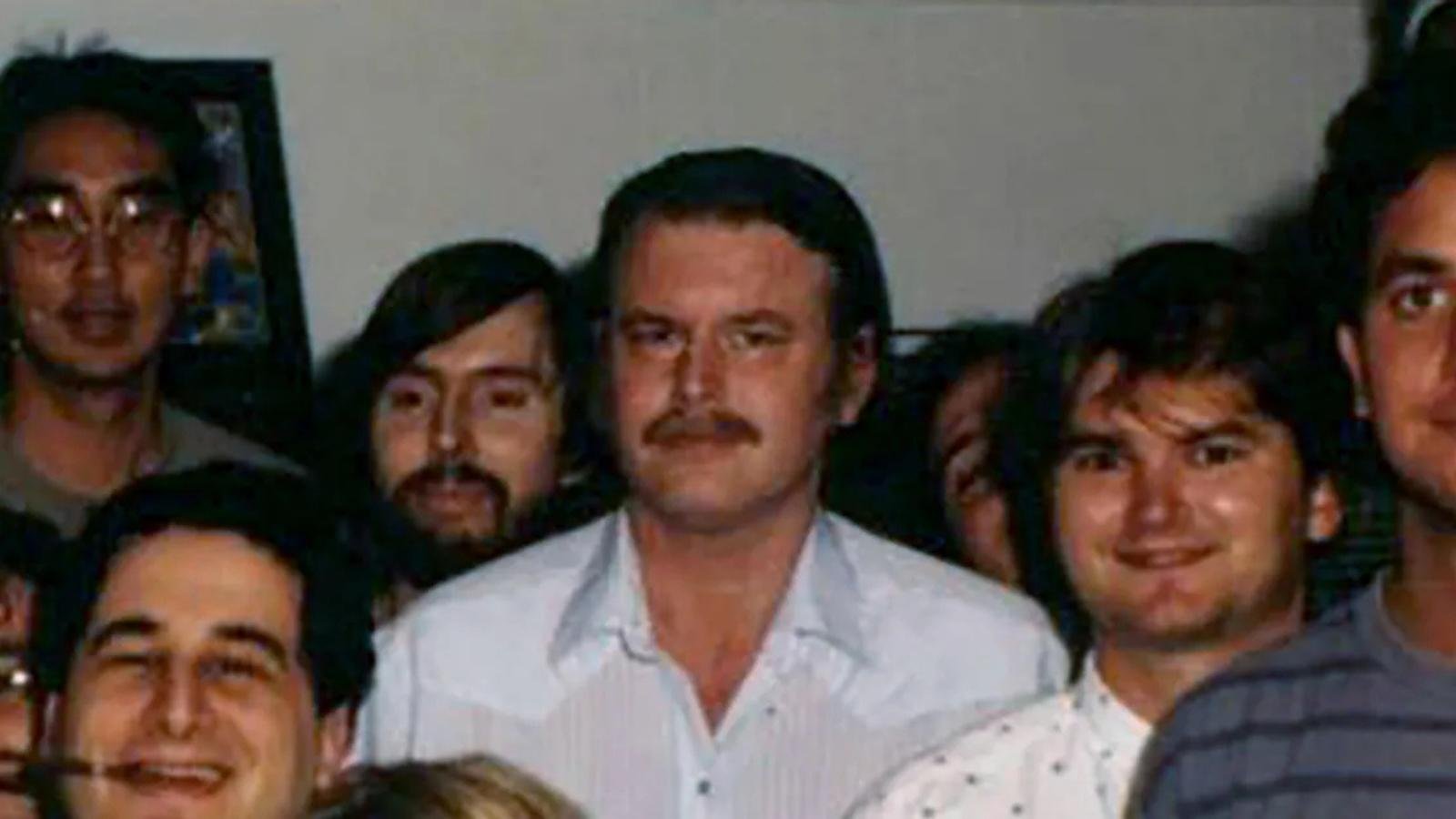
John Swartzwelder is the only Simpsons writer, with 7 of his jokes coming true as predictions. John didn’t attend an Ivy League college or start out in comedy writing. In fact, he began his career in advertising.
| Simpsons Writer | Number of Episodes Written | Number of Predictions that came true | Probability of Prediction |
| Greg Daniels | 8 | 4 | 50% |
| Bill Oakley | 13 | 5 | 38.5% |
| Josh Weinstein | 13 | 5 | 38.5% |
| John Swartzwelder | 59 | 7 | 11.9% |
This guy’s story is so different, it’s like he wandered onto the wrong set and accidentally became a legend.
Many consider him a dark horse in the writers’ room. Even fans claim him to be the greatest Simpsons writer of all time.
Unlike many public figures, John is a very low-key person. He’s been writing for The Simpsons since the 1990s, but his first interview appearance was in 2021 with the New Yorker.
Swartzwelder has a unique ability to find absurdity in everyday life. A taste that not everyone could stomach. Unfortunately, this sharp sense of humor led to his rejection, and was also fired from shows like SNL and Letterman early in his career.
But that very absurdity became the cornerstone of The Simpsons. The misunderstood genius finally finds his home.
Now, You might think that’s the whole story, but this is just one side of the equation because, at the end of all this, it’s just theory.
To get to the truth of these predictions, we need to calculate the total number of jokes in the entire Simpsons history and hopefully, find some pattern between them all.
While this idea of unraveling the truth about The Simpsons’ predictions is exciting, the amount of work ahead feels pretty overwhelming. It’s a bit scary how much digging I still need to do.
| No. | Episode No. | Episode Name | Year | Writer Name | Prediction | Predictions Number |
| 1 | Season 6 Episode 19 | Lisa’s Wedding | 1995 | Greg Daniels | London’s Shard, Library Robots, Smart Watches, FaceTime | 4 |
| 2 | Season 21 Episode 12 | Boy Meets Curl | 2010 | Rob LaZebnik | America wins Gold in Curling | 1 |
| 3 | Season 9 Episode 3 | Lisa’s Sax | 1997 | Al Jean | Ebola Virus | 1 |
| 4 | Season 5 Episode 17 | Lisa vs Malibu Stacy | 1994 | Bill Oakley, Josh Weinstein | Trump’s Arrest | 1 |
| 5 | Season 4 Episode 8 | New Kid on he Block | 1992 | Conan O’Brien | Buffet Scam | 1 |
| 6 | Season 4 Episode 20 | Whacking Day | 1993 | John Swartzwelder | Florida Python Challenge | 1 |
| 7 | Season 2 Episode 18 | Brush with Greatness | 1991 | Brian K. Roberts | Beatles Letter | 1 |
| 8 | Season 29 Episode 1 | The Serfsons | 2017 | Brian Kelley | Game of Thrones Finale | 1 |
| 9 | Season 10 Episode 1 | Lard of the Dance | 1998 | Jane O’Brien | Grease Theft | 1 |
| 10 | Season 6 Episode 8 | Lisa on Ice | 1994 | Mike Scully | Autocorrect | 1 |
| 11 | Season 17 Episode 10 | Homer’s Paternity Coot | 2006 | Joel H. Cohen | Ocean Gate Disaster | 1 |
| 12 | Season 6 Episode 25 | Who Shot Mr. Burns? | 1995 | Bill Oakley, Josh Weinstein | Block the Sun | 1 |
| 13 | Season 25 Episode 16 | You Don’t Have to Live Like a Referee | 2014 | Michael Price | FIFA Scandal | 1 |
| 14 | Season 5 Episode 10 | How I Learned to Stop Worrying and Love Legalized Gambling | 1993 | Bill Oakley, Josh Weinstein | White Tiger Attack | 1 |
| 15 | Season 10 Episode 2 | The Wizard of Evergreen Terrace | 1998 | John Swartzwelder | The God Particle Equation | 1 |
| 16 | Season 23 Episode 10 | Politically Inept, With Homer Simpson | 2012 | John Frink | Greek’s Economic Collapse | 1 |
| 17 | Season 20 Episode 4 | Treehouse of Horror XIX | 2008 | Matt Warburton | Bad Voting Machines | 1 |
| 18 | Season 11 Episode 5 | E-I-E-I-D’oh! | 1999 | Ian Maxtone-Graham | Nuclear Tomattoes | 1 |
| 19 | Season 25 Episode 15 | The War of Art | 2014 | Rob LaZebnik | Richard Branson Space Travel | 1 |
| 20 | NA | The Simpsons Movie | 2007 | Brooks, Groening, Al Jean, Mike Scully, Ian Maxtone-Graham, George Meyer, David Mirkin, Mike Reiss, Matt Selman, John Swartzwelder, Jon Vitti | NSA Spying | 1 |
| 21 | Season 5 Episode 19 | Sweet Seymour Skinner’s Baadasssss Song | 1994 | Bill Oakley, Josh Weinstein | Horse Meat | 1 |
| 22 | Season 2 Episode 4 | Two Cars in Every Garage and Three Eyes on Every Fish | 1990 | Sam Simon, John Swartzwelder | Three Eyed Fish | 1 |
| 23 | Season 2 Episode 9 | Itchy & Scratchy & Marge | 1990 | John Swartzwelder | Censoring Michelangelo’s David Statue | 1 |
| 24 | Season 22 Episode 1 | Elementary School Musical | 2010 | Tim Long | Nobel Prize | 1 |
| 25 | Season 7 Episode 21 | Homerpalooza | 1996 | Brent Forrester | Cypress Hill’s Orchestra | 1 |
| 26 | Season 23 Episode 22 | Lisa Goes Gaga | 2012 | Tim Long | Lady Gaga’s Superbowl | 1 |
| 27 | Season 10 Episode 5 | When You Wish Upon a Star | 1998 | Richard Appel | Disney x Fox Merger | 1 |
| 28 | Season 15 Episode 14 | The Ziff Who Came To Dinner | 2004 | Deb Lacusta, Dan Castellaneta | Matrix 4 | 1 |
| 29 | Season 16 Episode 6 | Midnight Rx | 2005 | Marc Wilmore | Legalize Marijuana | 1 |
| 30 | Season 28 Episode 2 | Friends and Family | 2016 | J. Stewart Burns | Apple Vision Pro | 1 |
| 31 | Season 3 Episode 16 | Homer at the Bat | 1992 | John Swartzwelder | Dom Mattingly’s Hair Problem | 1 |
| 32 | Season 11 Episode 12 | Bart to the Future | 2000 | Dan Greaney | Trump’s Presidency | 1 |
| 33 | Season 3, Episode 14 | Lisa the Greek | 1992 | Jay Kogen, Wallace Wolodarsky | Superbowl 26 | 1 |
| 34 | Season 3, Episode 14 | Lisa the Greek | 1993 | Jay Kogen, Wallace Wolodarsky | Superbowl 27 | 1 |
| 35 | Season 3, Episode 14 | Lisa the Greek | 1994 | Jay Kogen, Wallace Wolodarsky | Superbowl 28 | 1 |
| 36 | Season 13, Episode 22 | Papa’s Got a Brand New Badge | 2002 | Dana Gould | Toy Poodles scam | 1 |
| 37 | West Wing Short | 2019 | Al Jean | Joe Biden and Kamala Harris Elections | 1 | |
| 38 | Season 7 Episode 18 | The Day the Violence Died | 1996 | John Swartzwelder | Riots in Capitol | 1 |
| 39 | Season 4 Episode 21 | Marge in Chains | 1993 | Bill Oakley, Josh Weinstein | Killer Bees | 1 |
| 38 | NA | The Simpsons Movie | 2007 | Brooks, Groening, Al Jean, Mike Scully, Ian Maxtone-Graham, George Meyer, David Mirkin, Mike Reiss, Matt Selman, John Swartzwelder, Jon Vitti | Tom Hanks x US commercial | 1 |
| 40 | Season 4 Episode 6 | Itchy & Scratchy: The Movie | 1992 | John Swartzwelder | Bloody Theatrical Billboards | 1 |
| 41 | Season 9 Episode 1 | The City of New York vs. Homer Simpson | 1997 | Ian Maxtone-Graham | 9/11 Attack | 1 |
Note: It takes an average of 12.36 years for each Simpsons prediction to come true.
The Simpsons has been running for 35 years, and with its massive 768-episode catalog, this is the longest-running American TV show of all time.
I cannot possibly watch it all and note down each joke. So, I figured out a workaround.
Basically, I created the dream job for any Simpsons fanatic. I hired this poor soul to binge-watch five episodes from every single season. Their mission?
Count every joke, whether it’s a visual gag or a witty one-liner.
44 days later, he sent me this. Now, the rest is up to me.
| Season | Jokes per Minute (JPM) | Key Notes |
| 1 | 4.9 | Finding its footing, Tracey Ullman Show roots evident |
| 2 | 8.1 | Dramatic improvement, ‘Bart Gets an F’ showcases new potential |
| 3 | 10.5 | Classic era begins, ‘Homer at the Bat’ hits home run in laughs |
| 4 | 11.9 | Golden Age peaks, ‘Last Exit to Springfield’ is a comedic masterpiece |
| 5 | 10.8 | Maintaining brilliance, ‘Cape Feare’ sideshows excellence |
| 6 | 11 | Resurgence of wit, two-part ‘Who Shot Mr. Burns?’ captivates |
| 7 | 10.3 | Slight dip, but ’22 Short Films About Springfield’ innovates |
| 8 | 10.9 | Strong comeback, ‘Homer’s Enemy’ pushes boundaries |
| 9 | 9.8 | Last of the golden years, ‘The City of New York vs. Homer Simpson’ shines |
| 10 | 9.4 | Transition begins, ‘Homer Simpson in: Kidney Trouble’ shows change |
| 11 | 8.5 | Shift to more absurdist humor, ‘Behind the Laughter’ meta-hilarious |
| 12 | 8.1 | Uneven but somewhat promising, ‘Trilogy of Error’ experiments successfully |
| 13 | 7.2 | Al Jean returns as showrunner, steadier tone emerges |
| 14 | 8.3 | Consistency over peaks, ‘Bart vs. Lisa vs. the Third Grade’ typifies the era |
| 15 | 7.7 | Minor resurgence, ‘The Regina Monologues’ brings fresh laughs |
| 16 | 6 | Struggle for identity, ‘Thank God It’s Doomsday’ stands out |
| 17 | 6.4 | Slight improvement, ‘The Italian Bob’ offers international flair |
| 18 | 5.6 | Dip in form, ‘The Haw-Hawed Couple’ a bright spot |
| 19 | 6.1 | Movie year boost, ‘Eternal Moonshine of the Simpson Mind’ innovates |
| 20 | 5.4 | Anniversary season, HD debut with ‘Take My Life, Please’ |
| 21 | 5.8 | Unexpected uptick, ‘The Bob Next Door’ revives classic character |
| 22 | 4.9 | Decline resumes, ‘Homer the Father’ offers nostalgic laughs |
| 23 | 5.2 | Slight recovery, ‘Holidays of Future Passed’ impresses |
| 24 | 4.3 | Struggles continue, ‘Moonshine River’ attempts to recapture magic |
| 25 | 5 | Quarter-century milestone, ‘Brick Like Me’ Lego episode innovates |
| 26 | 4.2 | Sharp drop, crossover ‘The Simpsons Guy’ divisive |
| 27 | 4.6 | Minor comeback, ‘Halloween of Horror’ offers fresh scares |
| 28 | 4 | Another dip, ‘The Great Phatsby,’ ambitious two-parter |
| 29 | 4.3 | Slight improvement, ‘Grampy Can Ya Hear Me’ touches hearts |
| 30 | 4.9 | Anniversary boost, ‘Bart vs. Itchy & Scratchy’ tackles modern issues |
| 31 | 3.9 | Post-milestone drop, ‘Thanksgiving of Horror’ experiments |
| 32 | 4.2 | Pandemic era begins, ‘The Dad-Feelings Limited’ digs deep |
| 33 | 3.7 | Continued low density, ‘Pixelated and Afraid’ offers a fresh concept |
| 34 | 6.2 | Minor uptick, ‘Step Brother from the Same Planet’ surprises |
| 35 | 5.8 | The latest season balances classic style with contemporary themes |
Each Simpsons episode is a 22-minute laugh factory, pumping out an average of 6.8 jokes every minute. With 768 episodes and an 87-minute movie, this adds up to a massive 115,484 jokes!
Simpsons Math:
(22 minutes × 6.8 jokes/minute × 768 episodes) + (87 minutes × 6.8 jokes/minute)
114,508.8 jokes + 591.6 jokes = 115,484.4 jokes
Out of which only 44 jokes came true as predictions. So, the probability of a joke becoming a prediction is only 0.0381%.
Simpsons Math:
Probability = Total Number of Outcomes x 100/Number of Successful Outcomes
44 x 100/115,484.4 = 0.0381%
This means for every 10,000 jokes the Simpsons crack, only 3-4 of these come true. It’s as if we’re finding a needle in a haystack.
But, let’s go a step further, and calculate the probability of these odd predictions.
| No | Prediction | Episode No. | Writer |
| 1 | London’s Shard | Season 6 Episode 19 | Greg Daniels |
| 2 | Buffet Scam | Season 4 Episode 8 | Conan O’Brien |
| 3 | Horse Meat Scandal | Season 5 Episode 19 | Bill Oakley & Josh Weinstein |
| 4 | Three Eyed Fish | Season 2 Episode 4 | Sam Simon & John Swartzwelder |
| 5 | 9/11 Attack | Season 9 Episode 1 | Ian Maxtone-Graham |
From a total of 44 predictions, only 5 of these can be branded as the odd ones. The mysterious predictions with no logic to them, and the likelihood of one of these coming true out of all the jokes made is only 0.0043%.
Again, to put this into perspective, for every 10,000 jokes made on The Simpsons, less than half of an odd prediction actually comes true— just 0.43, to be exact.
These moments are so rare, they’re like a drop in the ocean, or Lisa getting a B+. It’s like finding a single thread in a haystack, and even when they do happen, The Simpsons doesn’t even tell us when or where these ‘predictions’ are supposed to take place.
So, what is it about these predictions that create such a buzz? Why do they capture so much attention, and why do they always go viral?
The Simpsons have nailed a few predictions, but let’s be real- they’re not the only ones with a crystal ball in their room. Plenty of shows have taken a lucky guess or two.
So, why has this goofy animated TV show, once known for just cracking jokes about our reality, transformed into this cartoon everyone turns to for a peek at what’s coming next?
How did they go from being America’s favorite dysfunctional clan to the unofficial prophets of pop culture?
When you break it down with enough data in your hands, the answer is pretty straightforward: Most of these predictions are just negative events. They’re about as cheerful as Mr. Burns on a good day.
Out of all the 44 predictions made by The Simpsons, 57% are negative, while only 43% are positive events.
So, this is it— the moment we’ve all been waiting for. The apex of everything we’ve explored together. It’s time to crack this case wide open!
The Simpsons isn’t really about predicting the future. These so-called glimpses into the future, they’re 89% of logical early reporting and 11% of the internet finding patterns in random events.
The numbers tell a story, but not the one we expected.
The question isn’t whether The Simpsons will predict our future or not, but whether we’ll continue to let them write it. Think about it: The future they show us isn’t inevitable – it’s a call to action, and what we do with that is up to us.

